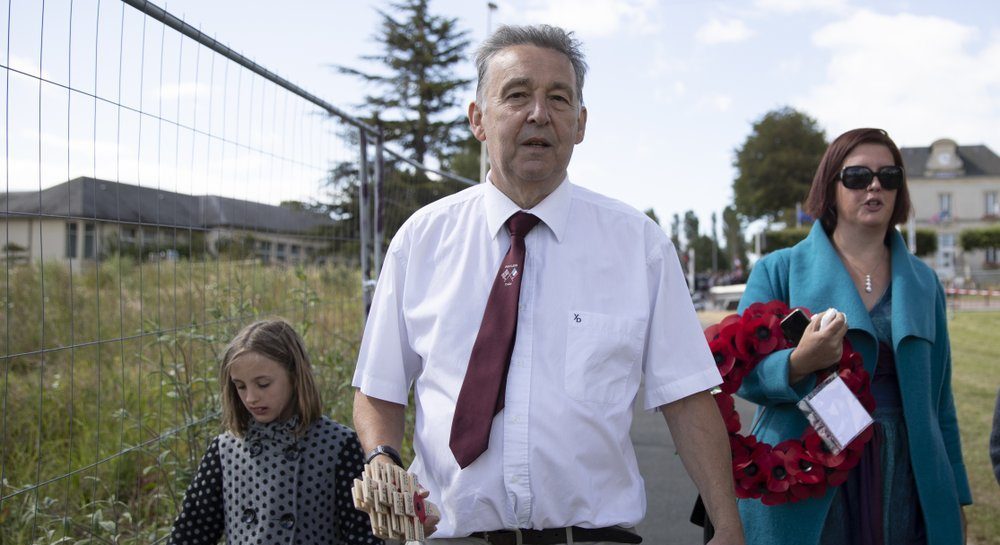The essence of war remembrance is to make sure the fallen are never forgotten. All it takes is a wreath, a tiny wooden cross, a little token on a faraway grave to show that people still care about their fallen hero, parent or grandparent.

This year, though, the coronavirus pandemic stepped in, barring all travel for families to visit the World War II graves in France‘s Normandy, where Saturday marks the 76th anniversary of the epic D-Day battle, when allied troops successfully stormed the beaches and turned the war against the Nazis.
So anguished families turned to the next best thing — an Englishman living on D-day territory, a pensioner with a big heart and a small hole in his agenda.
For years, Steven Oldrid, 66, had helping out with D-Day events around the beaches where British soldiers had landed — and often left their lives behind — be it organizing parking, getting pipers to show or getting sponsors for veterans’ dinners.
Laying wreaths though, seemed something special, reserved for families and close friends only.
But in pandemic times, pandemic rules apply. Oldrid was first contacted in March.
“I was actually choked up when I got the first request,” Oldrid said. “I’m always on the other side. Always in the background,” he said.
“They asked ` Steven, can you lay our wreath? Well, they sent me five, and then another one said, `Can you lay one for my granddad?’ `Can you lay one for my dad’?”

Get breaking National news
Before he knew, it in this extraordinary year, he had become the extraordinary wreathlayer — proof that kindness cannot be counted in pounds, euros or dollars, but in time and effort to organize a day around the wishes of others.

As June 6 approached, the boxes of wreaths and grave markers piled up in his garage. And to soothe the nerves of families, he has also been filming live for Facebook several ceremonies and wreathlayings.
Among those struggling with not being able to go to Normandy this year was Jane Barkway-Harney of the British veteran Glider Pilot Regiment Society, whose father participated in the D-day landings.
“It makes me feel physically sick because you feel as though you’re letting everybody down,” she said. “I feel so strongly that it is our right and our duty to go.”
Still, whatever Oldrid is asked “I know he’ll say `yes’ because he actually doesn’t know the word `no.’ It is not in his vocabulary,” said Barkway-Harney.
Through it all, he keeps a smile.
“It’s not ever, never will be a burden, he said “It’s a pleasure and an honour.”
What does he get in return? On the internet it is “Thank you, Steve. A big hearts and thumbs up,” he said.
And from his previous work helping out families and friends of veterans, he knows something else is coming too.
“They do actually bring me some English products like teabags and salad cream, baked beans and crisps for the kids.”

In a statement issued Saturday morning, Prime Minister Justin Trudeau said Canada remembers and honours the “brave Canadians and Newfoundlanders who fought, and those who gave their lives alongside Allied forces in a battle that became a turning point in the Second World War and changed the course of history.”
“The bravery and selflessness demonstrated by Canadians on that day in Normandy, and throughout the war, remind us of the incredible cost of defending freedom, human rights, and democracy,” the statement reads. “We must remember them, and the more than one million Canadians who served during the Second World War.”
Trudeau said although the COVID-19 pandemic has forced the commemorative ceremonies to be held online, all Canadians should pay tribute to “the courage and sacrifice of those who fought in the D-Day landings and the Battle of Normandy.”
“It is our solemn responsibility to remember those who served and sacrificed. They gave everything so that we can enjoy the peace and freedom that we hold so dear today,” he said in the statement. “Lest we forget.”
–With files from Global News








Comments
Want to discuss? Please read our Commenting Policy first.